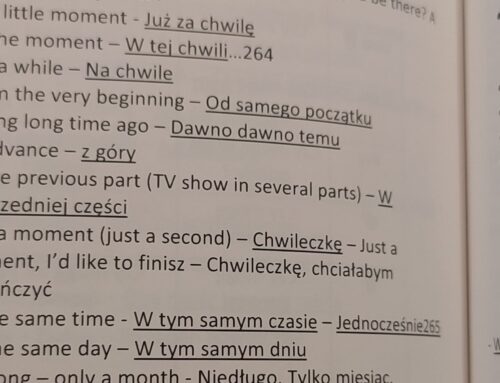By Ken, Teacher in Warsaw
Before I started teaching in Poland I was lucky enough to spend 3 years teaching in the hustling and bustling mega metropolis that is Tokyo. If you’ve never been, I would definitely put it on your bucket list! From the most succulent sushi to the charming cherry blossoms (sakura) there’s something for everyone! But we’re not here today to learn about my love for Tokyo, we’re here to look at some of the differences in teaching English between Poland and Japan. There are a lot, so let’s get stuck in, starting with…
Speechless in Seattle
Or in this case, Tokyo!
 Very, very few people speak English or are truly interested in learning proficient English in Japan. Most people who are born in Japan will go to school, work and die in Japan. I’ve even heard that many people don’t even visit Tokyo in their lifetimes, but instead live in their town or village and lead a very traditional lifestyle. Japan has a wonderfully unique culture and their hospitality is immaculate, but don’t expect them to know their phrasal verbs or tenses!
Very, very few people speak English or are truly interested in learning proficient English in Japan. Most people who are born in Japan will go to school, work and die in Japan. I’ve even heard that many people don’t even visit Tokyo in their lifetimes, but instead live in their town or village and lead a very traditional lifestyle. Japan has a wonderfully unique culture and their hospitality is immaculate, but don’t expect them to know their phrasal verbs or tenses!
In comparison, it’s very common to hear Polish people speak English, especially in big cities such as Warsaw and Krakow. They are much more interested in learning English and they travel a lot more to English-speaking countries than Japanese people. They also work in a lot more international companies that require English within their profession. Poles tend to think that their English isn’t great and are normally surprised when they’re told their English is good!
A lot of Japanese people try to learn English, but due to Japanese not translating well into English many give up after the basics. That’s not to say that there aren’t teaching opportunities in Japan, but if you want to actually teach English and not just the very basics, I’d recommend Poland.
Thinking of the children (and adults)
 You might be very surprised to hear, but English only became an official school subject in Japanese elementary schools a couple of years ago. Before that, they still had some lessons but no one really took it seriously. Now, with Japan becoming more and more prevalent on the international stage the Japanese Board of Education is really pushing English in schools.
You might be very surprised to hear, but English only became an official school subject in Japanese elementary schools a couple of years ago. Before that, they still had some lessons but no one really took it seriously. Now, with Japan becoming more and more prevalent on the international stage the Japanese Board of Education is really pushing English in schools.
The English that they teach in elementary schools in Japan is VERY basic. In fact, it wouldn’t even be enough to pass an A1 test! The difference in levels between Polish kids and Japanese kids is literally night and day. Most Polish kids and teens who actively study English will be able to have a fluent conversation using tenses, adverbs and adjectives whereas most Japanese kids have trouble putting a few sentences together. Pronunciation for them is hard also due to the nuances of their alphabets (Japanese consists of 3 alphabets!) Adults also have the same problem, and since English wasn’t seriously introduced to schools until quite recently the English proficiency level even with adults is extremely extremely low.
Let me entertain (and teach) you
Going back to teaching in Japan, I loved it! There were some major differences between teaching in Tokyo to teaching in Warsaw, such as:
- Teaching methods
As mentioned already, kids in Japan barely know any English, so most of the lessons consist of you being animated and doing a lot of flashcard games and simple chants such as “what do you like? I like bananas!” whereas teaching kids and young teens in Poland still consist of some games, but their vocabulary and language learning are far, far higher so some lessons consist of more conversational topics to help build confidence and speaking ability. In a way, I felt that I wasn’t really a teacher in Japan, but more of an entertainer.
- Motivations
English is a lot more common in Poland, and you can see it almost everywhere in big cities. In Japan, even Tokyo, seeing ANY English is relatively rare and when you do read some “Japanglish” it’s normally translated really badly and just about makes sense. A lot of Japanese people want to learn English just because they want to be able to go to places America to study and work, but Poles tend to want to learn English not just for study and work, but because they understand that English is the most common language and it will serve them well in future endeavours. Poles have a much deeper meaning to what learning English means for them and they realise that it’s not just a short-term thing.
Final thoughts
I feel very lucky to have lived and taught in two amazing cities. Truth be told, as much as I miss the organised chaos of Tokyo I much prefer teaching English in Poland due to the higher English abilities Poles have over their Japanese counterparts. Don’t get me wrong though, Japan is an experience like no other and if you are lucky enough to get the chance to visit there, please do! The kids I taught were adorable and I will forever cherish the memories I had of living and teaching there.
However, if you’re curious about what teaching opportunities there are in Warsaw and other areas of Poland, why not click here?




